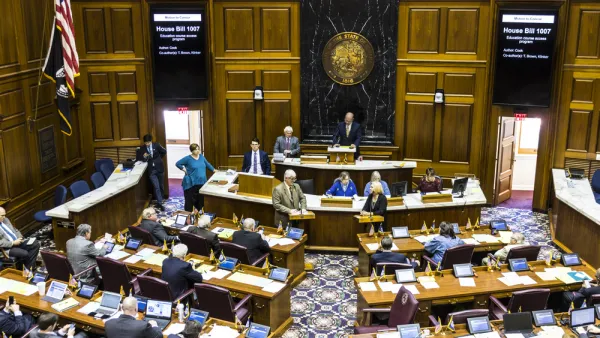Under the transportation funding plan proposed by Assembly Speaker Toni Atkins, motorists would pay an annual road user charge of about $50 to help pay for the $59 billion in deferred highway and bridge maintenance that Gov. Brown noted recently.
Calling the fee a "road user charge" may cause some confusion as it is also the name of a vehicle-miles-traveled (VMT) fee used in a bill (SB 1077) passed last year that is the basis for a new pilot project in the state. Unlike a VMT fee (also called mileage-based user fee) that varies based on the distance driven, Assembly Speaker Toni Atkins' fee would be fixed at "no more than $50 per year," according to a phone conversation with Atkin's spokesman, John Casey, though it might be higher for trucks and electric vehicles that pay no gas tax.
"Atkins has said the charge could be assessed as part of vehicle registrations or insurance plans," writes Chris Nichols of U-T San Diego. "The proposal would need Republican support because a two-thirds vote of the Legislature is required to pass new fees. The charge would go into effect during the 2015-16 fiscal year, which starts July 1."
Nichols writes that the new fee is estimated to raise $800 million annually. As for the remaining $1.2 billion, the speaker mostly resorts to a "diversion" strategy. "Her plan would also free up about $1 billion per year by returning truck weight fees to transportation accounts instead of general fund debt repayment," he writes.
Casey clarified that the general fund debt was in fact from transportation bonds, particularly the $20 billion in bonds the voters approved in 2006 known as Proposition 1B: Highway Safety, Traffic Reduction, Air Quality, and Port Security Bond Act. He also viewed the redirection of the funds as more of a restoration, not a diversion, as they had originally been direct to transportation accounts.
The plan would raise revenue to help meet Gov. Brown's infrastructure goal of spending $59 billion to repair highways and bridges that he mentioned as one of three infrastructure goals in his inaugural address last month. The goal is now formalized in the state's 2014 five-year infrastructure plan [PDF].
The plan does not appear to have been assigned a bill number yet. When it does, it will be noted in comments below.
As noted on Thursday, the state Board of Equalization will be voting on Feb. 24 to reduce the gasoline tax by 7.5 cents or 21 percent, punching a huge hole in the transportation budget.
FULL STORY: Early plans to raise transportation funds

Analysis: Cybertruck Fatality Rate Far Exceeds That of Ford Pinto
The Tesla Cybertruck was recalled seven times last year.

National Parks Layoffs Will Cause Communities to Lose Billions
Thousands of essential park workers were laid off this week, just before the busy spring break season.

Retro-silient?: America’s First “Eco-burb,” The Woodlands Turns 50
A master-planned community north of Houston offers lessons on green infrastructure and resilient design, but falls short of its founder’s lofty affordability and walkability goals.

Test News Post 1
This is a summary

Analysis: Cybertruck Fatality Rate Far Exceeds That of Ford Pinto
The Tesla Cybertruck was recalled seven times last year.

Test News Headline 46
Test for the image on the front page.
Urban Design for Planners 1: Software Tools
This six-course series explores essential urban design concepts using open source software and equips planners with the tools they need to participate fully in the urban design process.
Planning for Universal Design
Learn the tools for implementing Universal Design in planning regulations.
EMC Planning Group, Inc.
Planetizen
Planetizen
Mpact (formerly Rail~Volution)
Great Falls Development Authority, Inc.
HUDs Office of Policy Development and Research
NYU Wagner Graduate School of Public Service


























